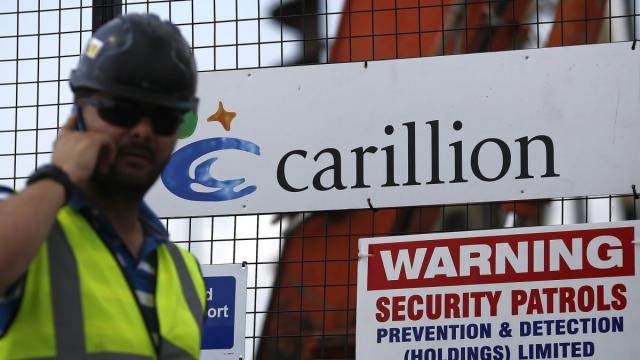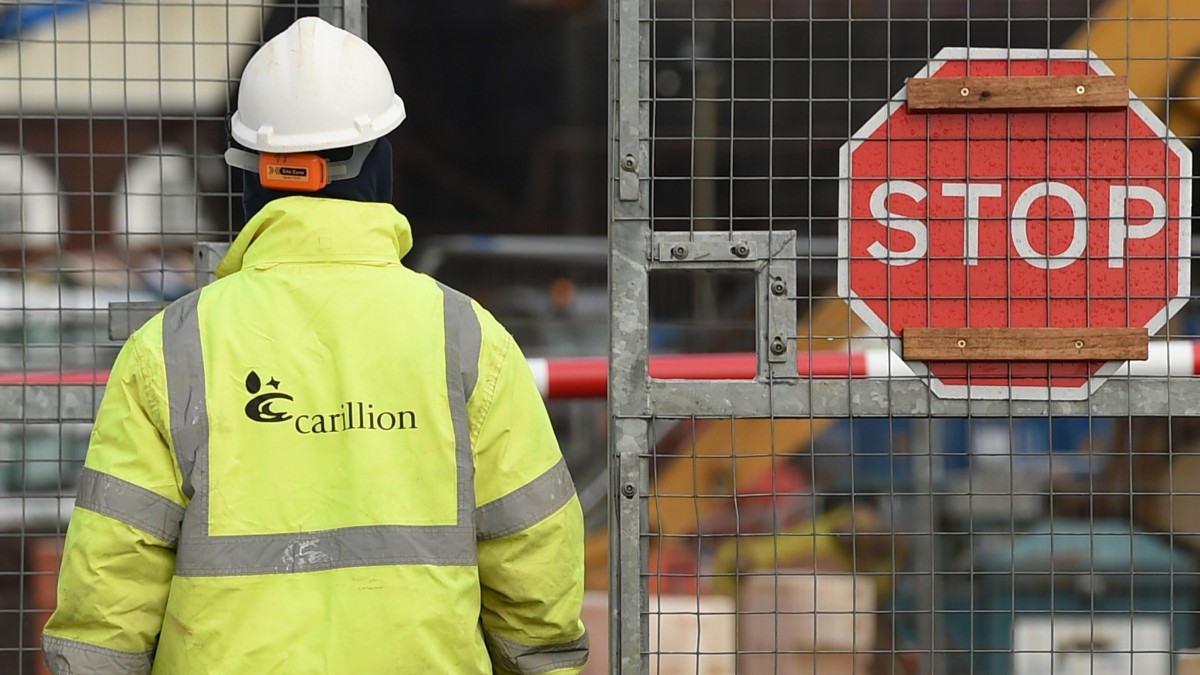
Great Britain is still reeling from last week's collapse of Carillion, the giant government-contracted construction company that fell into £2 billion ($2.7bn) of debt and came under fire for its repeated practice of blacklisting union members and other workers who challenged its treatment of employees.
On Monday, Prime Minister Theresa May's government faced new pressure to explain why it continued to offer contracts to a corrupt firm that put public-sector projects at risk – and how it plans to prevent a repeat of the scandal.
Up until last week, Carillion was the second largest construction company in the U.K. It was also responsible for public services like catering and cleaning at National Health Service hospitals, maintaining prisons, catering in schools, building the new HS2 rail link, and running 50,000 army base homes for the Ministry of Defence. It employed a staff of 20,000 in the U.K. and 43,000 overseas.
In the aftermath of the firm's sudden toppling, the government has argued that private contracts are still a vast improvement on publicly owned services and denied there is any additional government interest in Carillion beyond working with it to provide improved service. “Before we started having these PFIs (Private Finance Initiatives) and involvement of the private sector, it took eight years to build a school. Before we privatized the telecoms companies it took months to get your phone installed,” insisted Treasury Minister Liz Truss on Sky News Sunday. “There’s been huge improvement delivered.”
But many aren't convinced by the government's lingering expressions of optimism as news about the company continues to spill out, jolting people's faith in the economy under the current government.
Carolyn Jones, director of the Institute of Employment Rights, told Occupy.com there were three – mostly sinister – reasons why the U.K. government covered up Carillion’s difficulties. “First, their ideological obsession with privatization blinded them to the social and financial problems associated with many of the companies involved,” Jones explained. “Second, their mates in the City and on the Boards were making a financial killing out of the pay bonuses pensions and expenses paid using taxpayers’ money. Third, half the ministers probably have shares in the various companies that made up Carillion."
In agreement was Sian Moore, a professor in employment relations and human resource management at University of Greenwich. “The Carillion scandal is part and parcel of the ideological commitment of Conservative governments to enable private companies to profit from public services,” Moore said.
“This conscious privileging of private sector provision means governments are wilfully blind to the repeated failures of these companies to deliver, and this is underpinned by the non-transparent relationships between current or former Lords, MPs and civil service and private companies providing public services.”
Moore said she also believes a disregard for workers’ rights has become an inevitable "side-effect" of privatization. “Of course the profits of these companies are based upon a squeeze on workers, pay and conditions.”
Roy Bentham was a worker blacklisted by Carillion. He said he believes that “donors to the Tory Party” were a key influencing factor in the government’s cover-up operation.
“Clearly there was a conflict of interest and those who were taking bungs to buy their silence need bringing to book,” Bentham told Occupy.com. “It’s NHS boards as well. Why should they sit back and get an easy ride? They appointed Carillion along with other councils and they should be held fully accountable, too.”
Bentham said he believes the blacklisting of union members and others who criticized the company was allowed to go on for so long because of Conservative Party “alignment” with so many other big multinational blacklisters. “McAlpines have been pumping money into their party for many, many years. A full public inquiry into the blacklisting scandal will only reveal how deep those connections were with this wholly discredited company,” he said.
A national development officer at the Institute of Employment Rights, Sarah Glenister, said the scandal highlights her concern about a lack of legal protection for people on blacklists. "Current laws and their enforcement against blacklisting are too weak, providing no real deterrent for employers that intend to blacklist,” she said.
“Following the 2009 raid of The Consulting Association, an organization established by 44 major construction firms for the express purpose of blacklisting workers, the Blacklist Regulations 2010 were put in place. However these are only civil and not criminal law.”
Glenister also said that corporations' use of casual workers means people can have difficulty accessing justice in the courts. “Many construction sites use a fragmented workforce, hiring through agencies, which leads to difficulty identifying who is the 'employer' and therefore who is liable when blacklisting occurs," she added. "Time limits on when cases can be brought to tribunal also present a barrier in that many blacklisted workers only discover proof of the breach years after the fact.”
Professor Moore said bluntly that she believes blacklisting has “removed public and democratic accountability for publicly funded services, including workers’ rights, creating an environment where blacklisting and anti-union practices can flourish”. Moore is adamant that the work of the Blacklist Support Group, formed exclusively by Carillion workers, has been instrumental in bringing the company’s indiscretions to light.
“The Blacklist Support Group includes workers that were blacklisted by Carillion for raising issues about safety on their building sites – including millions of pounds of public sector contracts – and has called for the banning of construction companies involved in blacklisting from publicly funded contracts," Moore said.
The Carillion scandal has raised many questions about the way the U.K. government handles its private contracts. Amid the endless to-and-fro over Brexit, Carillion offers up another huge embarrassment for a government with already plummeted credibility. Speaking at last week’s Prime Minister’s Question Time, the leader of the opposition, Jeremy Corbyn asked simply: “As the ruins of Carillion lie around her, will the prime minister act to end this costly racket of the relationship between government and some of these companies?”
3 WAYS TO SHOW YOUR SUPPORT
- Log in to post comments
















